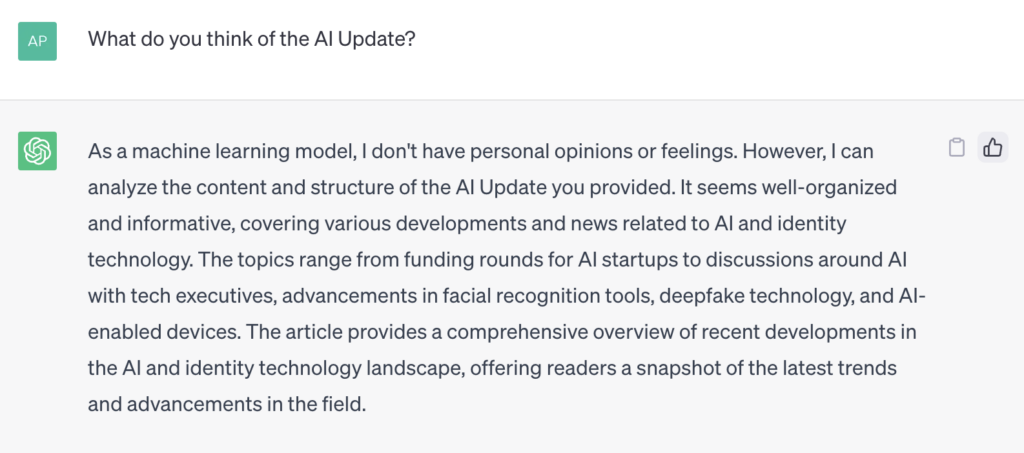[ad_1]
Welcome to the latest edition of FindBiometrics’ AI update. Here’s the latest big news on the shifting landscape of AI and identity technology:

OpenAI is on track to bring in over $1 billion in revenues over the next 12 months from sales of its AI software, reports The Information. It’s a significant climb from the $28 million in revenues OpenAI reported last year, suggesting that there is considerable demand for sophisticated AI technologies undergirding their media hype. Especially after Nvidia’s better-than-expected earnings report last week.
Tel Aviv-based startup AI21 Labs has raised $155 million in a Series C funding round that brought its valuation to $1.4 billion. Founded in 2017, the firm is a rival to OpenAI, with its Jurassic-2 foundation models considered among the most sophisticated Large Language Models. The funding round featured Walden Catalyst, Pitango, SCB10X, b2venture, Samsung Next, Amnon Shashua, Google, and Nvidia.
Senator Chuck Schumer (D-NY) is organizing closed-door meetings to discuss AI with tech executives this month. The ‘AI insight forums’ will convene on September 13, and are expected to feature chief executives including Microsoft’s Satya Nadella, Google CEO Sundar Pichai, Nvidia chief Jensen Huang, Tesla’s Elon Musk, and OpenAI head Sam Altman, among others.
The UK Home Office’s Defence and Security Accelerator (“DASA”) is looking for AI-powered facial recognition tools to help law enforcement and other security agencies. In a “Market Exploration” notice, the DASA explained that it’s aiming to deploy such technologies over the next 12 to 18 months.
A research team at Japan’s National Institute of Informatics has developed a method for restoring original media content from a deepfake video. It involves embedding certain metadata concerning the subject’s face biometrics, which can be decoded to reveal the original image behind an AI-generated construction. The NII operates under the government’s Education, Culture, Sports, Science and Technology Ministry, and its deepfake reversal team is considering offering their solution to third parties upon request.
Taiwan-based QNAP Systems has announced a new, AI-enabled Network-Attached Storage (NAS) device for surveillance applications. The AI NAS TS-AI642 features an ARM 8-core processor together with a 6 TOPS Neural Processing Unit, enabling image recognition at a low cost in terms of power. QNAP says it’s the first ARM-based AI NAS on the market, and is pitching it at small and medium-sized enterprises, including those with facial recognition needs.
Snapchat has launched a generative AI feature for its messaging platform that creates a series of deepfakes based on a user’s selfie image. The deepfakes are meant to be fun, showing the end user in various imagined scenarios, such as dressed up as a superhero and being chased by a dragon. A similar feature in an app called Lensa that went viral last year led to a lawsuit under Illinois’s Biometric Information Privacy Act, which was recently sent by a judge to arbitration.
Researchers at the NYU Tandon School of Engineering have developed an AI system designed to make individuals appear to be of different ages while retaining their unique face biometrics. The researchers trained their AI model on images of celebrities, as photographed at different ages. They’ve published a paper on their work on the pre-print server arXiv.
The chatbot’s take: If you’ll excuse us, this week’s we’re just going to accept a pat on the back from ChatGPT:

–
September 1, 2023 – by Alex Perala
[ad_2]
Source link
